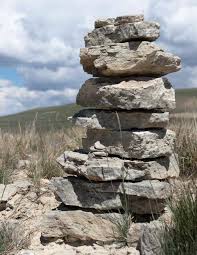So Jacob Took a Stone and Set It Up as a Pillar,
and He Called It Galeed
31: 43-55
So Jacob took a stone and set it up as a pillar, and he called it Galeed DIG: How was Laban’s greeting to Jacob on his arrival different from his farewell when Jacob left? What changed his attitude?
REFLECT: When someone tries to make himself or herself look good at your expense, how do you react? What does the Bible have to say about syncretism (see John 14:6)? Do you fear the Lord? Should you fear Him (see Proverbs 9:10)?
When Laban finally spoke, he didn’t even try to defend himself. He just changed the subject. Laban answered: The women are my daughters, the children are my children, and the flocks are my flocks. All you see is mine. Yet, what can I do today about these daughters of mine, or about the children they have borne (31:43)? Laban’s implication was this: How could Jacob think that he would do anything to hurt his daughters or his grandchildren? More than that, everything that Ya’akov had had come from Laban. So why wasn’t Jacob grateful to him for giving him the opportunity to acquire them?
Although he knew he was in the wrong, a self-seeking hypocrite like Laban could not bring himself to admit it in front of his entire family. He was an expert at shifting the blame away from himself, so he proposed a formal covenant, or treaty, between himself and Jacob. Laban said: Come now, let’s make a treaty, you and I and let it serve as a witness between us. Jacob (Hebrew: Ya’akov) already made one pact with Laban about his wages for service, which Laban didn’t honor. Why should Jacob think Laban had changed? Ya’akov does not answer, but only responds with action.496 He knew that both men should remember such a treaty. So Ya’akov took a large stone and set it up as a pillar, or matzeivah. Then he said to his relatives, “Gather some stones.” So they took stones and piled them in a heap, or gal, supporting the pillar, and they ate there by the heap (31:44-46). But what should they name this place, so they could remember it?
Naming it in his own Aramaic language, Laban called it Jegar Sahadutha, which means a heap of witness. Then Jacob translated the same phrase into Hebrew, and called it Galeed. Laban said: This heap is a witness between you and me today. That is why it was called Galeed. Even though Laban had already named this place the heap of witness, he added to it the Hebrew name Mizpah, meaning watchtower. He said: May ADONAI keep watch between you and me when we are away from each other (31:47-49). Laban did not intend this as a blessing; it was a warning for two men who could not trust each other. Laban did not want Jacob crossing back over to Haran with the household gods to claim his property.

Still trying to justify his pursuit of Ya’akov, Laban took the initiative of proposing the terms of the treaty after the pillar and stones had been erected. If you mistreat my daughters or if you take any wives besides my daughters, even though no one is with us, remember that God is a witness between you and me. Laban even tried to take credit for setting up the heap of witness by saying: Here is this heap, and here is this pillar I have set between you and me. This heap is a witness, and this pillar is a witness, that I will not go past this heap to your side to harm you and that you will not go past this pillar to my side to harm me (31:50-52). Therefore, to cross the pillar would break the treaty and render the household gods useless. In describing the terms of the treaty, Laban used projection, projecting his real thoughts and feelings about himself onto Jacob, projecting his own untrustworthiness onto Ya’akov. The undependable Laban was trying to imply that Jacob was a slippery character who needed to be watched and bound by a whole series of terms and conditions.497
According to Laban, this pillar or memorial was to serve as a witness and the gods were to umpire between Ya’akov and himself. Believing in syncretism, or the belief that all paths lead to God, Laban placed his own favorite household god, or the god of Nahor, the god of their father Terah, who had worshiped other gods (Joshua 24:2), and the God of Abraham on the same level.498 Rather than trying to clear up Laban’s theological confusion or start an argument, Ya’akov simply made his oath in the name of the God who had been the God his father Isaac (31:53).
Most of the day was gone by that time and both men retreated to their respective camps in the hill country of Gilead for one last night before departing the next morning. Jacob was so thankful and relieved for ADONAI’s final deliverance from Laban that he offered a sacrifice there in the hill country and invited his relatives to a meal. After they had eaten, they spent the night there. Early the next morning Laban came back from his own camp and kissed his grandchildren and his daughters and blessed them. He knew that at the very least they must have come to resent him by now, and he was probably feeling a little remorse. However, he could not humble himself to apologize to Ya’akov or give him any words of blessing, so he left and returned home (31:54-55). Like Lot after leaving his two daughters (19:34-38), no further mention is made of Laban again in Scripture. It is probably merciful of ADONAI not to say any more about him.499



Leave A Comment